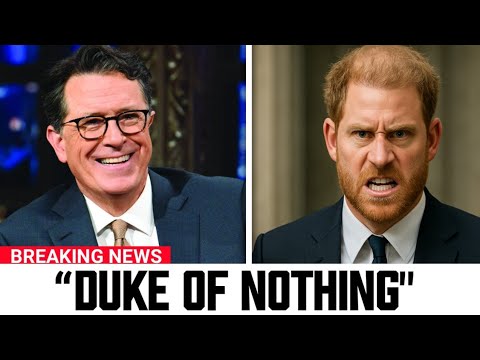Prince Harry abruptly walked off The Late Show with Stephen Colbert following an exchange that left viewers stunned and sparked global debate. What started as a routine guest appearance quickly spiraled into an emotionally charged moment that exposed deep-seated insecurities and reignited public conversation about Harry’s post-royal life. The tension erupted when Stephen Colbert, known for his witty and often edgy humor, made a sarcastic remark referring to Harry as the “Duke of Nothing”—a jab that cut deeper than anyone in the audience could have anticipated.
At first, everything on set unfolded as expected. The show opened with Colbert’s usual charm, welcoming Harry warmly and acknowledging his current projects. The tone was upbeat, the audience engaged, and Harry seemed relaxed. He spoke about his mental health advocacy, shared personal insights, and presented himself as someone trying to create purpose outside the monarchy. Viewers could sense that Harry was enjoying being seen not as a prince, but as a passionate, grounded individual trying to make a difference.
However, the mood shifted dramatically when Colbert asked a seemingly playful question about his title. He quipped, “You’re still the Duke of Sussex… but what’s it like being the Duke of, well, nothing?” The room went silent. The air turned cold. What was meant to be a clever line landed like a gut punch. Harry’s smile faltered, and for a few heartbeats, he didn’t respond.
The audience murmured as the impact of the comment sank in. Though Colbert attempted to downplay the moment with a laugh and clarified that it was all in jest, the damage was already done. Harry’s demeanor changed instantly—his posture stiffened, his expression hardened, and the warmth in his voice faded.
He responded with restraint, stating that titles don’t define a person and that what truly matters is the work one does and the values one lives by. It was a composed and measured response, but it felt carefully controlled—perhaps too much so. The emotional undercurrent was undeniable. Colbert, sensing the rising tension, tried to redirect the conversation, but the spark of discomfort had been lit. Harry, no longer fully engaged, gave shorter answers and avoided eye contact. The flow of the interview had been broken, and the once easy rapport had dissipated.
The breaking point came when Colbert joked again about royal titles, saying, “It’s funny how titles stick around even when there’s no castle nearby. Like wearing a crown with no kingdom.” That was it. Harry silently removed his microphone, muttered something that the cameras didn’t catch, and left the stage. The audience gasped. Some called out to him, urging him to stay, but he didn’t turn back. The host looked briefly stunned, unsure if what had happened was real or just an act for the cameras. But the confusion didn’t last. It was clear Harry had walked off in earnest.
Behind the scenes, production scrambled to respond. Colbert, quick on his feet, tried to fill the awkward space with improvisation, joking that his royal garden party invitation was probably canceled. The audience laughed nervously, trying to recover from the awkwardness they had just witnessed. But social media was already ablaze. Within minutes, clips of Harry’s exit flooded timelines, hashtags began trending, and public opinion split in two. Some defended Harry, saying the joke was a cheap shot and showed a lack of empathy. Others accused him of being overly sensitive, arguing that in choosing a life in the public eye, he should be prepared to handle uncomfortable humor.
Harry’s representatives later issued a statement explaining that the comment had touched a deeply personal nerve, especially given the sacrifices he made in stepping away from royal life. They emphasized that Harry had expected a respectful conversation and was caught off guard by the mockery. Colbert’s team, meanwhile, reiterated that humor is a central part of his show and that there was no intention to insult or belittle.
As the media frenzy intensified, royal experts began offering their takes. Some viewed Harry’s reaction as evidence of internal conflict—his desire to carve out a new identity while still grappling with the shadows of his past. Others suggested the moment highlighted a cultural disconnect: Americans often view titles and monarchy with a level of skepticism or irreverence that doesn’t always land well with those raised inside such systems. For many, the incident was not just a late-night blunder but a window into the complex identity crisis Harry continues to face.
In the days following, Harry stayed quiet. He retreated to his California home with Meghan and their children, avoiding the public spotlight as speculation swirled. Would he speak out? Would there be another interview explaining his side of the story? Or would this moment simply fade into the long list of royal controversies? No one knew for sure.
What is clear is that this episode highlighted the vulnerability of a man trying to straddle two very different worlds. In Britain, Harry was born into a centuries-old institution that offered status, duty, and protection. In America, he’s a celebrity figure—admired by some, mocked by others, and constantly under the microscope. The joke about being the “Duke of Nothing” may have seemed harmless to some, but for Harry, it likely echoed a painful question he’s already asked himself: Who is he now without the title, the uniform, or the institution behind him?
The moment he left that stage, Harry entered a new chapter in his life—one where he is more exposed, more scrutinized, and more alone than ever before. Whether he rises above this latest storm or allows it to define him remains to be seen. But one truth stands: even without a kingdom, Prince Harry remains one of the most talked-about figures of our time, and every step he takes continues to shape the legacy he’s building beyond the palace walls.
